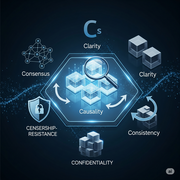At Creator Chain, we focus on providing articles about blockchain technology—specifically its infrastructure, protocols, and real-world applications beyond cryptocurrencies. In this tutorial, we explore the “Cs” of blockchain: consensus, cryptography, and computing structure—the underlying foundations of distributed ledger systems.
Consensus
Blockchain gets rid of centralized control and replaces it with decentralized agreement. Consensus methods, like Proof of Work, Proof of Stake, and Byzantine Fault Tolerance, make sure that all nodes agree on the same ledger state.
No single party controls the system. Instead, peer-to-peer collaboration assures integrity and immutability, making this one of the most critical “Cs” in commercial blockchain installations.
How Math Can Protect You with Cryptography
The record is safe because of cryptography. Each block has an encryption hash of the block before it, which makes it safe to link blocks together. Identity and the security of deals are checked by digital signatures and encryption.
Construction of Blockchain
A blockchain is a decentralized database that uses a network of computers called nodes to verify and store information. Nodes, networks, blocks, and transactions make up its infrastructure, while smart contracts and decentralized applications (dApps) make up its application layers. Transparent data sharing across organizations is made possible by this computing structure.
Examples of Use: Practical Uses Beyond Money
 Blockchain technology excels in areas where cryptocurrencies are not used, such as digital identity verification, voting systems, healthcare data, and supply chain tracking.
Blockchain technology excels in areas where cryptocurrencies are not used, such as digital identity verification, voting systems, healthcare data, and supply chain tracking.
What the “Cs” Really Mean
Trust can be decentralized through consensus. Cryptography guarantees unchangeability and security. How the network functions decentralized is defined by its computing structure.
End Notes
Computer structure, consensus, and cryptography are the Cs of blockchain. Knowing these is the best place to begin your blockchain journey. Here at Creator Chain, we have this goal of eliminating these innovative layers to enlighten the innovative ways of transforming data processes and business systems without using bitcoin.